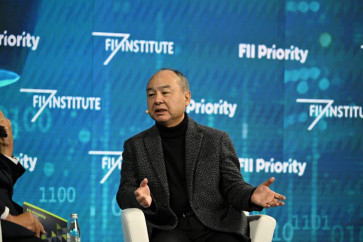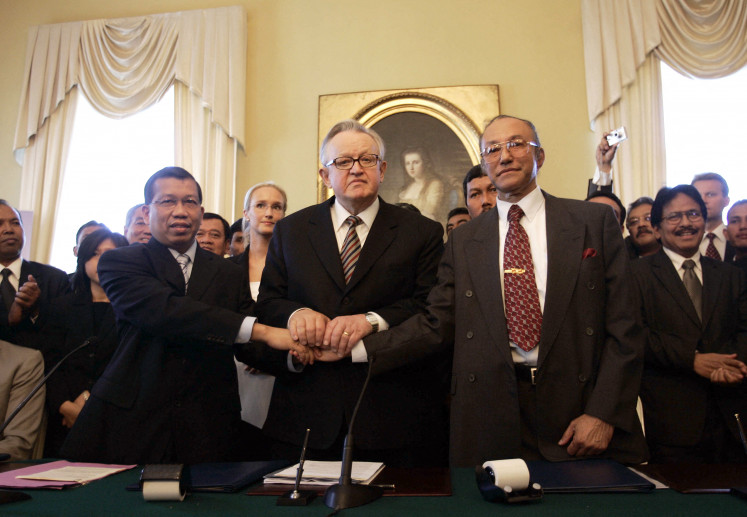Popular Reads
Top Results
Can't find what you're looking for?
View all search resultsPopular Reads
Top Results
Can't find what you're looking for?
View all search resultsBI putting end to loose monetary stance
In a surprise move, newly installed Bank Indonesia (BI) Governor Agus Martowardojo on Thursday raised the benchmark interest rate by 25 basis points to 6 percent in what the central bank called a preemptive move to safeguard the ailing rupiah and rising inflation
Change text size
Gift Premium Articles
to Anyone
I
n a surprise move, newly installed Bank Indonesia (BI) Governor Agus Martowardojo on Thursday raised the benchmark interest rate by 25 basis points to 6 percent in what the central bank called a preemptive move to safeguard the ailing rupiah and rising inflation.
The hike was the first adjustment in the BI rate in 15 months, with Agus practically putting an end to the loose monetary stance held firm by his predecessor Darmin Nasution, who stepped down on May 23. Darmin had kept the BI rate steady at a historic low level of 5.75 percent since February 2012.
'This is a pre-emptive move to respond against the build-up inflation expectations, the pressure on the rupiah and the rising uncertainty in the global financial market, the latest of which has exerted economic stresses not only in Indonesia but also in other countries in the region,' Deputy Governor Perry Warjiyo told a press briefing at BI's headquarters in Jakarta on Thursday.
Economists from the World Bank, Bank Danamon and Standard Chartered Bank described the rate hike as a 'bold move' from BI, saying that such monetary tightening was necessary to maintain stability in the economy.
The central bank has struggled to get a firm grip on the rupiah, which breached the psychological barrier of 10,000 per US dollar earlier this week, as foreign investors sold their Indonesian assets amid concerns that the US would scale back its monetary stimulus and slow recovery of the Chinese economy.
The rupiah tumbled 0.3 percent to 9,887, prices from local banks compiled by BI in the Jakarta Interbank Spot Dollar Rate (JISDOR) show, despite the increase in the interest rate. The Jakarta Composite Index (JCI), the main price barometer on the Indonesian Stock Exchange (IDX) also fell nearly 2 percent to close at 4,607.66 as sell-off continued to dominate trading.
Going forward, BI is now preparing to unleash new monetary instruments to boost the rupiah's stability, according to Perry.
'We are now mulling to make our non-tradable rupiah term deposits tradable in the form of 'negotiable term deposits',' the deputy governor said. Should banks be allowed to trade their term deposits, it would smoothen the liquidity flow of the rupiah in the market, he explained.
BI is also studying the possibility of establishing an auction scheme for local lenders carrying out foreign exchange (forex) swap agreements, a term used to define transactions whose payments or installments utilized two or more currencies.
'To date, banks involved in forex swaps normally do it in the form of bilateral agreements. If this can be done in an auction scheme then we might draw more [transactions],' Perry said, adding that it would eventually lead to a stronger forex market.
BI's decision to increase the key interest rate was its second monetary tightening move in a week. On Wednesday it raised its overnight facility rate (Fasbi) by a quarter percentage point to 4.25 percent.
Credit Suisse economist Robert Prior-Wandesforde argued that both moves signaled that BI, under Agus's leadership, might be shifting gears into hawkish, a term coined for a central bank prioritizing stability rather than economic growth. 'The big question [...] is whether the same actions would have been taken by the previous BI Governor,' he wrote in a research note.
Similar views were shared by Gundy Cahyadi, an economist with OCBC Bank in Singapore. 'This was a strong statement by the new BI governor, particularly since some market players had doubts about his independence from the government.'
As for BI's upcoming tightening moves, Gundy predicted that Agus would deliver another BI rate
hike of 25 basis points in the next meeting in June, and a total Fasbi rate hike of 50 basis points before year's end.










